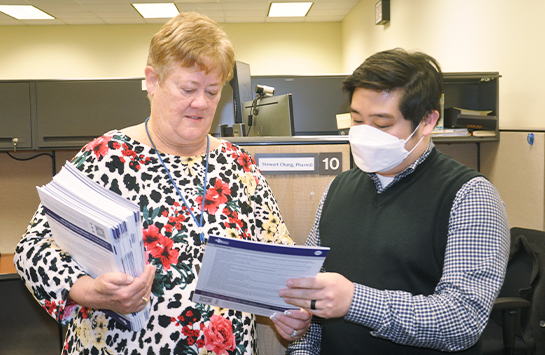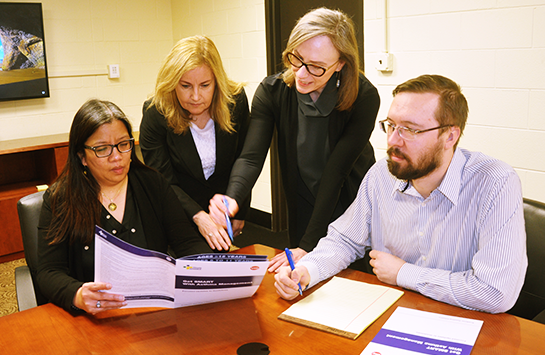UIC Expands Academic Detailing Initiative

Illinois ADVANCE, the nation’s largest academic detailing unit, takes its existing opioid program nationwide while extending its efforts in Illinois to address other disease states.
Intro

The UIC College of Pharmacy continues to inhabit a prominent and expanding role in the fast-rising field of academic detailing.
After years of educating Illinois physicians and prescribers about opioids in academic detailing visits, UIC-based Illinois ADVANCE (Academic Detailing Visits and New Evidence Center)—the nation’s largest academic detailing unit—is now talking opioids with prescribers across the country and broadening its existing academic detailing work in Illinois to include other chronic health conditions.
“Having an evidence-based presentation from a balanced, knowledgeable group of peers plays a valuable role in prescribing and clinical decision-making and helps to optimize patient care,” says Mary Moody, BS ’79, associate dean for professional and governmental affairs and head of Illinois ADVANCE.
Illinois Advance Goes Nationwide

Last October, Illinois ADVANCE received a U.S. Food & Drug Administration grant to educate the nation’s healthcare providers about risk evaluation and mitigation strategies surrounding opioids, thereby extending the group’s well-established program in Illinois. Over the program’s first two months, academic detailers discussed opioid risks with more than 150 physicians across every region of the United States via virtual sessions.
“We’ve embraced the opportunity to take our unique approach to education, one that has resonated with
physicians and proven successful in Illinois, to more prescribers across the country,” Moody says of her team, which features 30 clinical pharmacists.
In the one-on-one meetings, which often run 15–20 minutes, Illinois ADVANCE detailers share unbiased, up-to-date, and evidence-based information on the risks of opioids. Following an initial needs assessment, the detailers tailor subsequent information to each provider, sharing the latest research and insights on topics such as when and how to use the high-potency agents and how to successfully taper opioid use. The current grant runs through August 2023.
“These individualized visits offer providers a chance to ask questions they might not otherwise ask in a group setting,” says Moody, adding that Illinois ADVANCE has worked with state medical agencies, pharmacy societies, and physician organizations to spotlight its academic work while also leveraging social media campaigns and, increasingly, word of mouth among prescribers to broaden its reach.
In early December, Illinois ADVANCE detailer Dr. Amy Madhiwala, PharmD ’11, met with a physician in Michigan who shared gratitude for the opportunity to have a focused conversation with a pharmacist knowledgeable about opioids.
“She didn’t know academic detailing about opioids existed and was so grateful for our conversation,” Madhiwala says. “It’s nice to know we’re making an impact across the United States and helping to make our healthcare colleagues’ lives a pinch easier.”
And Illinois ADVANCE’s impact extends beyond anecdotal reports. In a paper published in the November/December 2020 issue of the Journal of the American Pharmacists Association, a team of researchers from the UIC College of Pharmacy noted a reduction in opioid prescribing among clinicians following academic detailing visits.
“We’re seeing our education lead to changes in prescribing, which means our efforts are resonating,” Moody says.
Academic Detailing Beyond Opioids
Embracing its leading role in the accelerating academic detailing field, an effort initially modeled after the work of pharmaceutical manufacturers to promote their drugs, the Illinois ADVANCE team has expanded in other ways too.
A 2019 Illinois law required the establishment of an evidence-based, noncommercial education program for the state’s Medicaid prescribers. While that effort began with opioids—an immediate and pressing statewide
need—the law required academic detailers to eventually address other chronic diseases. As such, the UIC group has gradually incorporated various other conditions into its portfolio, including diabetes, asthma, smoking, RSV, hypertension, and hyperlipidemia. Following an unexpected increase in syphilis among adolescents in the state, the Illinois ADVANCE team introduced detailing on sexually transmitted infections as well as HIV PrEP and PEP.
Since January 2020, Illinois ADVANCE detailers have completed more than 700 visits with Illinois physicians and prescribers, Moody notes, and released numerous one-hour educational programs on topics such as asthma, RSV, and hypertension on its website.
Between the academic detailing visits and the online programming, Moody says Illinois ADVANCE continues to help prescribers keep pace with evolving medical literature and to offer objective information that avoids touting any one treatment over another.
“We don’t have a dog in the race and are focused solely on the evidence,” Moody says. “Ultimately, we want prescribers more aware and informed when prescribing. That’s our foremost goal.”
UIC College of Pharmacy dean Glen Schumock considers the growth of Illinois ADVANCE and academic detailing as a whole important to helping physicians and other providers enhance patient care with respect
to medications. It also represents an extension of the
college’s overarching mission to educate and serve.
“Who better than pharmacists to be educating physicians about using medications?” Schumock asks. “While education is a function of every pharmacist, academic detailing formalizes it and makes it into a population-level program rather than a patient-level program. It expands education to the nth degree.”
A Compelling Opportunity for Pharmacists
Academic detailing’s continued rise is a significant development for pharmacists as well, elevating the standing of pharmacists in the healthcare landscape and unlocking another unique professional opportunity for pharmacists to practice at the top of their license.
When Madhiwala entered pharmacy school in 2007, she did so envisioning a career in retail pharmacy, prospects she then fulfilled for nearly two years after graduation. In 2013, however, she transitioned to working in managed care at UIC, where she has been heavily involved in academic detailing over the last three years.
“Academic detailing has offered a completely different professional experience than I ever imagined for myself as a pharmacy student,” Madhiwala says. “I’ve enjoyed spending one-on-one time with providers and
informing them about new medications and guidelines, hearing about the barriers and concerns they face, and identifying resources to help drive patient care in positive directions.”
At UIC, PharmD students can shadow academic detailers during their first year and complete an academic detailing rotation during their final year of pharmacy school as well. The exposure to academic detailing helps students understand potential professional roles outside of the traditional tracks in clinical or retail pharmacy and also arms them with universal skills they can employ in their careers, such as effectively communicating their knowledge to other healthcare professionals.
“The College of Pharmacy is always on the cutting edge of change for pharmacy, and academic detailing continues that tradition,” Moody says. “Before we started doing academic detailing in Illinois, no one else was doing it. We’re helping prescribers, patients, and students, and that’s an incredibly gratifying feeling.”